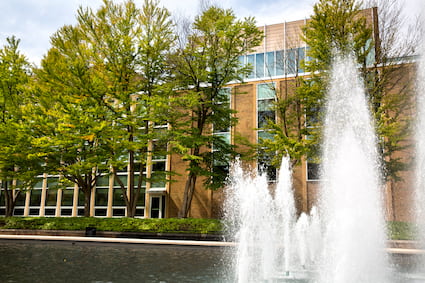
Global leadership in facilitating nuclear deployment and dialogue
Beyond research, Michigan Engineering is engaging around the world and at home to promote safe, effective adoption of nuclear energy.

Beyond research, Michigan Engineering is engaging around the world and at home to promote safe, effective adoption of nuclear energy.
Deployment of nuclear energy depends on more than technology, and University of Michigan researchers are catalyzing international dialogue and community engagement to garner public support and offer policy options. They’re doing this through workshops, partnerships, presentations and hosting stakeholders from around the globe.
Later this fall, the Department of Nuclear Engineering and Radiological Sciences (NERS) will host the Organization for Economic Cooperation and Development’s Nuclear Energy Agency Global Forum Symposium, designed to strengthen international cooperation on nuclear education.

Advancing nuclear energy
from discovery to deployment
From Sept. 30 to Oct. 2, 2025, around 150 stakeholders representing government, academic and research institutions, industry and civil society from OECD’s 38 member countries will converge in Ann Arbor. Coinciding with the symposium, U-M nuclear engineering organizers have planned activities open to the public, providing opportunities for broader community engagement. Find out more about the open sessions.
In recent years, U-M’s Fastest Path to Zero Initiative, anchored in NERS, has engaged with leaders and researchers in Japan. In 2024, the initiative co-hosted a workshop in Sendai, Japan, that brought together nuclear experts, policymakers, and industry leaders from both countries. The event focused on energy policies, deployment scenarios, economic impacts and workforce. Read more about the workshop in Japan.
“The workshop participants saw a lot of value in comparing differences in practices and policies across the two countries and learning from each other,” said Aditi Verma, an assistant professor of nuclear engineering and radiological sciences. “A recurring theme expressed by participants across all breakout groups was the need for earlier and better public engagement, including as early as the technology design and development phase. We see strong potential for collaboration here between the two countries.”
In June, six researchers from NERS and the Fastest Path to Zero participated in the International Atomic Energy Agency’s (IAEA) first International Conference on Stakeholder Engagement for Nuclear Power Programs in Vienna, Austria. They presented. Presentations spanned topics including strategies for early and personalized community engagement in reactor siting, the business case for stakeholder engagement, the role of cultural and historical context in building trust with host communities, and an immersive virtual reality model to support nuclear education and public engagement. Read more about the presentations in Austria.